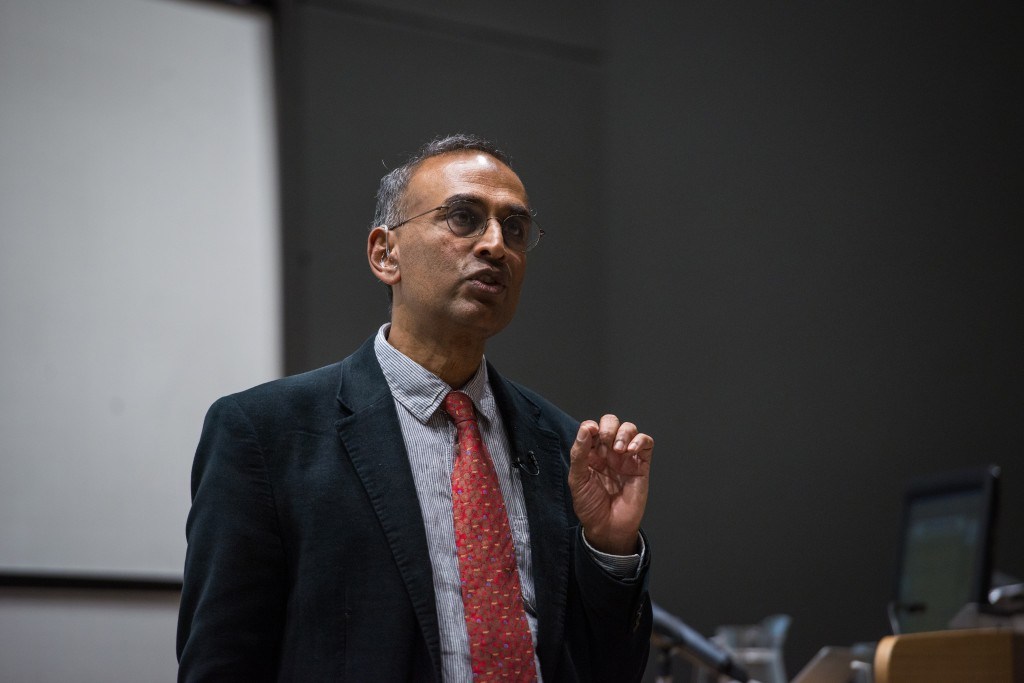“All this sectarian squabble about who eats what kind of meat and all this religious antagonism between different groups is harmful to the country,” Venkatraman Ramakrishnan said.

Venkatraman Ramakrishnan. Courtesy: Somerville College website
New Delhi: Nobel laureate in chemistry Venkatraman Ramakrishnan has said that Indian should spend more time thinking about education, particularly in science and technology, and not be caught up in “all this sectarian squabble about who eats what kind of meat”.
Speaking at the headquarters of the Medical Research Council’s Laboratory of Molecular Biology in Cambridge, UK, the Telegraph quoted Ramakrishnan as saying, “unless India invests in innovation, science and technology, it’s going to lose the race”.
“It’s already quite far behind China, and if you consider (that) 50 years ago the two countries were really pretty much comparable…. In fact, I would have said India was probably slightly better off than China.”
Ramakrishnan was not talking about a specific incident, Telegraph said, but about the general change in preoccupations: “Another problem I see in India is that it is still a country that has all the sectarian squabbles. If they don’t say, ‘Look we are not going to be fighting with each other but rather we are going to get on, become more tolerant with each other and get on with the task of modernising the country,’ if they don’t do that, they will simply keep losing ground.”
“All this sectarian squabble about who eats what kind of meat and all this religious antagonism between different groups is harmful to the country,” the Nobel laureate added, though he was not asked any specific questions on the issue. “People who do it, maybe they think they are being very patriotic, but actually they are hurting the country. Either they don’t realise it because they are too ignorant or they realise it and are hell bent on doing it anyway.”
Ramakrishnan shared the Nobel prize for chemistry with two others in 2009. In his speech, he also talked about the changes needed in the education system. Children should study the core science subjects – mathematics, physics, chemistry and biology – all through school and also have some kind of scientific study built into their undergraduate courses, he said. He added that the reverse is also important: those focusing on science should also be exposed to the humanities and social sciences.
Progress, Ramakrishnan added, is not possible without adequate investment in science. “In the modern world, you can’t be a leading, prosperous country based purely on labour costs or raw materials. In fact, there is a thing called ‘the curse of resource’. Countries that are resource-rich but knowledge-poor end up being fairly poor countries or less developed,” the newspaper quoted him as saying.
“For a country its size, India has much less investment in science and innovation than Britain.”
India has been relying only on its cheap labour to attract foreign companies and investment, the 61 year old argued, but that would not last because of the increase in automation.”The number of jobs in manufacturing is not going to be what it was in the 20th century, let alone the 19th century when it was all manual…. And so, this idea that ‘we are going to compete on labour costs and become some big manufacturing hub’ may last for the next few years but eventually that’s going to be superseded by robotics.”
The first step? Better education, according to the Nobel laureate. “India needs, first of all, better education – it’s still only a small fraction that gets educated. It needs a huge and much greater investment in science and technology if it is to compete in the future. And then it needs to incentivise investment in R&D by private companies. The government cannot and really should not do it all alone but should have incentives to build up their R&D. Generally, focusing on education and training and investing in science and technology is the only way to go,” Telegraph quoted Ramakrishnan as saying.
[“Source-thewire”]
